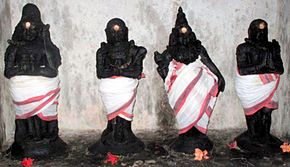- Manikkavacakar
-
Tirumurai The twelve volumes of Tamil Shaivite hymns of the sixty-three Nayanars 1, 2, 3. Tirukadaikkappu Campantar 4, 5, 6. Tevaram Appar 7. Tirupaatu Cuntarar 8. Tiruvacakam and Tirukkovaiyar Manikkavacakar 9. Tiruvisaippa & Tiruppallaandu Various poets 10. Tirumandhiram Tirumular 11. Prabandham Various poets 12. Periya Puranam Sekkizhar Manikkavacakar (மாணிக்கவாசகர் - literally words like jewels) was a Tamil poet who wrote Tiruvacakam, a book of Shaiva hymns. Manikkavacakar was one of the poets of the Hindu bhakti revival: his work forms one volume of the Tirumurai, the key religious text of Tamil Shaiva Siddhanta. A minister to the Pandya king Varagunavarman II (c. 862 C.E. – 885 C.E.), he lived in Madurai. His work is a poetic expression of the joy of God-experience, the anguish of being separated from God. Although he is a prominent saint in Southern India, he is not counted among the sixty-three nayanars. His stories are a part of the culture courses in Indian primary schools like Bharatiya Vidya Bhavans.
Contents
Life and works
Manikkavacakar is said to have been born in Vadhavoor(Thiruvadhavoor, near by melur(madurai Dt)), seven miles from Madurai on the banks of river Vaigai. He was a adi saiva brahmin servitor who wore the top tilted knot to denote his servitorship to sivan as a part of profession, like other servitors like sambandar etc. A poetic and elaborate hagiography of manikkavasagar and his works was written in 16th century and is called tiruvilayadal puranam meaning " An account of divine deeds ". The same is not available now in its original form. Another called vadhavoorar puranam and yet another sanskrit work of 12th century .C.E on the same saint is now missing.
According to legend the king had selected Manikkavasagar as a part of his legion seeing and had once entrusted him with a large amount of money to purchase horses for his cavalry. On his way he met an ascetic devotee of Siva, who in fact was Siva himself. Manikkavacakar received enlightenment, realised that material things are transitory and built the temple of Siva in Tirupperunturai with the money.[1]
Thereafter Manikkavacakar moved from one place to other, singing and composing devotional songs. Finally, he settled in Chidambaram. His Tiruvacakam is placed near the idol of Shiva there.
Manikkavacakar's work has several parts. The Tiruvembavai , a collection of twenty hymns in which he has imagined himself as a woman following the Paavai Nonbu and praising Shiva. The twenty songs of Tiruvembavai and ten songs of Tiruppalliezhuchi on the Tirupperunturai Lord are sung all over Tamil Nadu in the holy month of Margazhi ( The 9th month of the Tamil calendar, December and January).
His festival is celebrated in the Tamil month of Aani . Manikkavacakar's hagiography is found in the Thiruvilaiyadar Puranam (16th century AD).
Associated temples
- Sculptures illustrating his life are found in the Minakshi-Sundaresvara temple at Madurai.[2]
- Manikkavacakar is said to have built the temple of Siva in Tirupperunturai.[3]
- He is said to have lived at Chidambaram.
- He is closely associated with Tiru Uthirakosamangai.
Notes
- ^ http://www.nandhi.com/manickavasagar.htm
- ^ R.K.K. Rajarajan, Art of the Vijayanagara-Nayakas: Architecture and Iconography, Sharada Publications, Delhi 2006.
- ^ http://www.nandhi.com/manickavasagar.htm
References
- Dictionary of Hindu Lore and Legend (ISBN 0-500-51088-1) by Anna Dallapiccola
- http://www.tamilnation.org/sathyam/east/thiruvasagam/tvasagam0.htm
- http://www.webcitation.org/query?url=http://www.geocities.com/thiruvasakam_in_symphony/index.html&date=2009-10-25+23:04:05
- http://www.shaivam.org/admanika.htm Life history of Manikkavasagar
- http://www.shaivam.org/siddhanta/thiru8.html Complete thiruvacakam and thirukkovaiyar
Categories:
Wikimedia Foundation. 2010.

